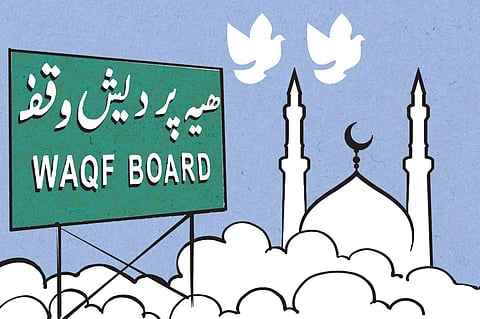

When India gained independence, many religious institutions held huge properties as assets. Most of them were endowments given by the Indian rajas or nawabs. Some were British-gifted. Most of the temple properties were taken over by the government, as befitting a secular state and were distributed to the needy as land reforms. However, when it came to the properties held by the Muslim religious establishments, a different yardstick was applied. India has had a legal regime for the governance of Waqfs since 1913, with the Muslim Wakf Validating Act.
This was amended as the Musalman Wakf Act in 1923 and with the Central Waqf Act in 1954. However, with the Waqf Act of 1995, a totally discriminatory act was enforced in India. Until then, the civil court of India had the power of jurisdiction over any dispute related to Waqf property. While the 1995 Act aimed to unify and standardise the management of these properties, it has inadvertently led to many issues, primarily by granting overwhelming power to the Waqf Boards. This has sparked discussions about the Act’s fairness, its implications on India’s secular fabric, and the pressing need for reforms.
The Waqf Act of 1995 bestowed total authority on local Waqf Boards for managing and regulating properties. There have been many complaints regarding the way in which such boards function. When absolute power is given to anybody, absolute corruption and absolute misuse are natural results. Many members of these boards have been known to act with a sense of autocracy.
Since not even the Supreme Court can question their power, the common public is at the mercy of an extra-constitutional, sectarian institution. The principle of “once a Waqf, always a Waqf”, creates a situation where claims can be made on properties, seemingly without due consideration for existing legal ownership or documentation. This has led to instances of encroachment and disputes, fostering a climate of mistrust and grievances, particularly among non-Muslim communities.
There are multiple instances of Waqf Boards claiming properties that do not have any historical association with Waqf, compelling individuals and families to seek “No Objection Certificates” to sell their properties. Such examples illustrate a significant imbalance, raising questions about fairness and transparency.
With the Waqf Boards operating with limited checks on their authority, inter-community disputes and claims have escalated. This has led to the perception that state policies favour one religious entity over others, potentially alienating non-Muslim citizens. In an already vitrified atmosphere of communal mistrust, such bizarre laws become the tool in the hands of politicians to divide and rule.
Take the case of Thiruchentharai village, built around an ancient temple that predates Islam. The village has been claimed as a Waqf property and the hapless residents have to take an NOC from the Waqf for any land transaction. In Kerala’s Cherai village, a centuries-old Church has been claimed by the Waqf board as their property, leading to an agitation by the local parish members. As befitting the peculiar nature of ‘secularism’, the Kerala Legislative Assembly has voted unanimously against the proposed Waqf (Amendment) Bill, 2024, which is under review by the Joint Parliamentary Committee.
Other bizarre claims by various Waqf boards and individuals include the Dev Bhumi of Bet Dwarka of Gujarat, Surat Municipal Corporation, Bangalore Idgah grounds, Mukesh Ambani’s multibillion residence in Mumbai and Indian Parliament House, among others. Such instances reinforce divisions by creating a narrative in which one community’s rights are seen to infringe on another’s. The absence of judicial oversight in Tribunal decisions under the Act further complicates this issue.
The prevailing Waqf Act enables a religious institution to wield substantial authority over non-religious, secular matters, potentially violating India’s secular principles. The Act’s current provisions give Waqf Boards excessive discretion, essentially allowing a religious body to operate almost independently. This connection between religious authority and civil governance blurs the lines of separation between religion and state and raises questions about fairness and inclusivity.
Proposed amendments, like those suggested in the Waqf (Amendment) Bill, 2024, take several steps in the right direction by advocating for greater transparency, accountability, and inclusivity in Waqf management. It provides judicial oversight, an avenue for appeals against tribunal decisions, and fosters a culture of accountability within Waqf operations.
It introduces inclusivity in Governance through the introduction of non-Muslim members within Waqf Boards, and the stipulation for representation from various sects of Islam ensures that the governance structure is more reflective of India’s pluralistic society. It also limits the dictatorial powers of Waqf Boards in determining property status, which can mitigate disputes regarding ownership and help uphold the rights of individuals. Introducing requirements for periodic audits of Waqf property management will enhance transparency and ensure that Waqf assets are being utilised effectively.
More debate and discussion on the Waqf Act in public forums is needed to make it fairer to all concerned. The fear of hurting ‘secularism’ should not hold anyone back from seeing the truth. The Waqf Act of 1995 belongs to the dustbin of history. The earlier the JPC sees the truth, the better it will be for the country’s social cohesion.
Anand Neelakantan
Author of Asura, Ajaya series, Vanara and Bahubali trilogy
mail@asura.co.in